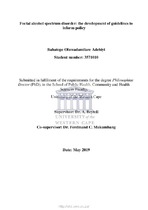Foetal alcohol spectrum disorder: The development of guidelines to inform policy
Abstract
Introduction: Maternal alcohol consumption during pregnancy can result to birth defects, which may be developmental, intellectual and physical. Fetal alcohol spectrum disorder (FASD) is a term used to describe an array of disorders related to alcohol consumption during pregnancy. FASD is a severe public health problem globally, with South Africa having the highest prevalence (29 to 290 per 1000 live births). What makes the FASD problem severe in the country is rife of maternal risk factors and widespread binge drinking during pregnancy. There is no policy specifically addressing FASD despite being pervasive in South Africa. Government programmes to prevent and manage FASD remain limited and fragmental across relevant departments. Herein, we aimed to conduct a multi-method study with a modified Delphi approach to developing a guideline to inform the development of a comprehensive and multi-sectoral policy for the prevention and management of FASD.
Method and analysis: We used a modified version of the World Health Organization’s approach to guideline development in three phases. In phase 1, we conducted four different studies to design the initial guideline prototype. The studies include an in-depth interview with policymakers and a focus group with relevant service providers on policy requirements for FASD, a document review of policies on FASD and a scoping review of various interventions employed for the prevention and management of FASD. The second phase involved using the initially developed guideline prototype to engage with the local and international experts on FASD for improvement on the content. In the third phase, we refined the prototype using a modified Delphi approach. Framework method and content analysis were used to analyse the qualitative data while the Statistical Package for Social Science (SPSS) software was used to analyse the quantitative data.

